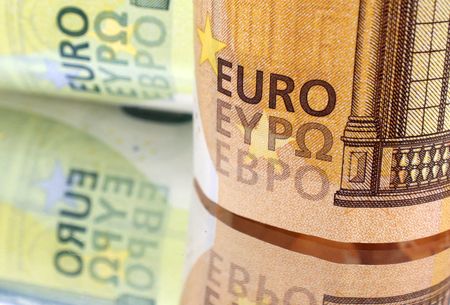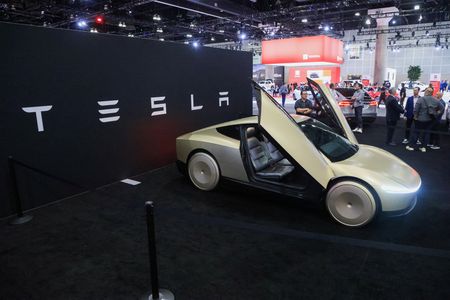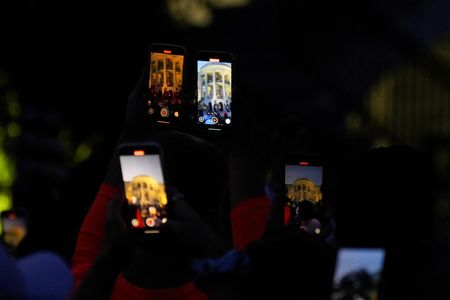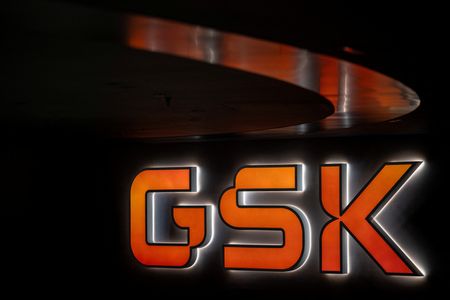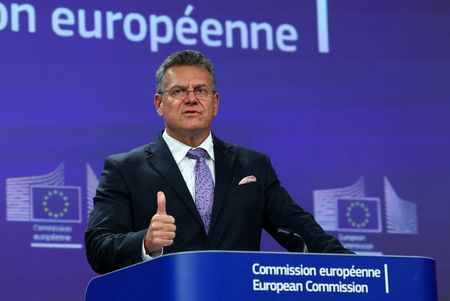By David Lawder and Greta Rosen Fondahn
STOCKHOLM (Reuters) -Top U.S. and Chinese economic officials met in Stockholm on Monday for more than five hours of talks aimed at resolving longstanding economic disputes at the centre of a trade war between the world’s top two economies, seeking to extend a truce by three months.
U.S. Treasury Chief Scott Bessent was part of a U.S. negotiating team that arrived at Rosenbad, the Swedish prime minister’s office in central Stockholm, in the early afternoon. China’s Vice Premier He Lifeng was also seen at the venue on video footage.
China is facing an August 12 deadline to reach a durable tariff agreement with President Donald Trump’s administration, after Beijing and Washington reached preliminary deals in May and June to end weeks of escalating tit-for-tat tariffs and a cut-off of rare earth minerals.
Negotiators from the two sides were seen exiting the office around 8 p.m. (1800 GMT) and did not stop to speak with reporters. The discussions are expected to resume on Tuesday.
Trump touched on the talks during a wide-ranging press conference with British Prime Minister Keir Starmer in Scotland.
“I’d love to see China open up their country,” Trump said.
Without an agreement, global supply chains could face renewed turmoil from U.S. duties snapping back to triple-digit levels that would amount to a bilateral trade embargo.
U.S. Trade Representative Jamieson Greer said he did not expect “some kind of enormous breakthrough today” at the talks in Stockholm that he was attending.
“What I expect is continued monitoring and checking in on the implementation of our agreement thus far, making sure that key critical minerals are flowing between the parties and setting the groundwork for enhanced trade and balanced trade going forward,” he told CNBC.
The Stockholm talks follow Trump’s biggest trade deal yet with the European Union on Sunday for a 15% tariff on most EU goods exports to the United States.
XI-TRUMP MEETING?
Trade analysts said another 90-day extension of a tariff and export control truce struck in mid-May between China and the United States was likely.
An extension would facilitate planning for a potential meeting between Trump and Chinese President Xi Jinping in late October or early November.
The Financial Times reported on Monday that the U.S. had paused curbs on tech exports to China to avoid disrupting trade talks with Beijing and support Trump’s efforts to secure a meeting with Xi this year.
Meanwhile, in Washington, U.S. senators from both major parties plan to introduce bills this week targeting China over its treatment of minority groups, dissidents, and Taiwan, emphasizing security and human rights, which could complicate talks in Stockholm.
Taiwan President Lai Ching-te is set to delay an August trip his team had floated to the Trump administration that would have included stops in the United States, sources familiar with the matter told Reuters on Monday.
The potential visit would have infuriated Beijing, possibly derailing the trade talks. China claims Taiwan as its own territory, a position Taiwan rejects, and denounces any show of support for Taipei from Washington.
Previous U.S.-China trade talks in Geneva and London in May and June focused on bringing U.S. and Chinese retaliatory tariffs down from triple-digit levels and restoring the flow of rare earth minerals halted by China and Nvidia’s H20 AI chips, and other goods halted by the United States.
So far, the talks have not delved into broader economic issues. They include U.S. complaints that China’s state-led, export-driven model is flooding world markets with cheap goods, and Beijing’s complaints that U.S. national security export controls on tech goods seek to stunt Chinese growth.
“Geneva and London were really just about trying to get the relationship back on track so that they could, at some point, actually negotiate about the issues which animate the disagreement between the countries in the first place,” said Scott Kennedy, a China economics expert at the Center for Strategic and International Studies in Washington.
Bessent has already flagged a deadline extension and has said he wants China to rebalance its economy away from exports to more domestic consumption — a decades-long goal for U.S. policymakers.
Analysts say the U.S.-China negotiations are far more complex than those with other Asian countries and will require more time. China’s grip on the global market for rare earth minerals and magnets, used in everything from military hardware to car windshield wiper motors, has proved to be an effective leverage point on U.S. industries.
(Reporting by David Lawder, Greta Rosen Fondahn, Marie Mannes, Janis Laizans and Maria Martinez in Stockholm; additional reporting by Liz Lee and Yukun Zhang in Beijing, Terje Solsvik and Gwladys Fouche in Oslo and Bhargav Acharya in Toronto; writing by David Lawder and Keith Weir; Editing by Diane Craft, Stephen Coates, Emelia Sithole-Matarise, Rod Nickel and Chizu Nomiyama )




